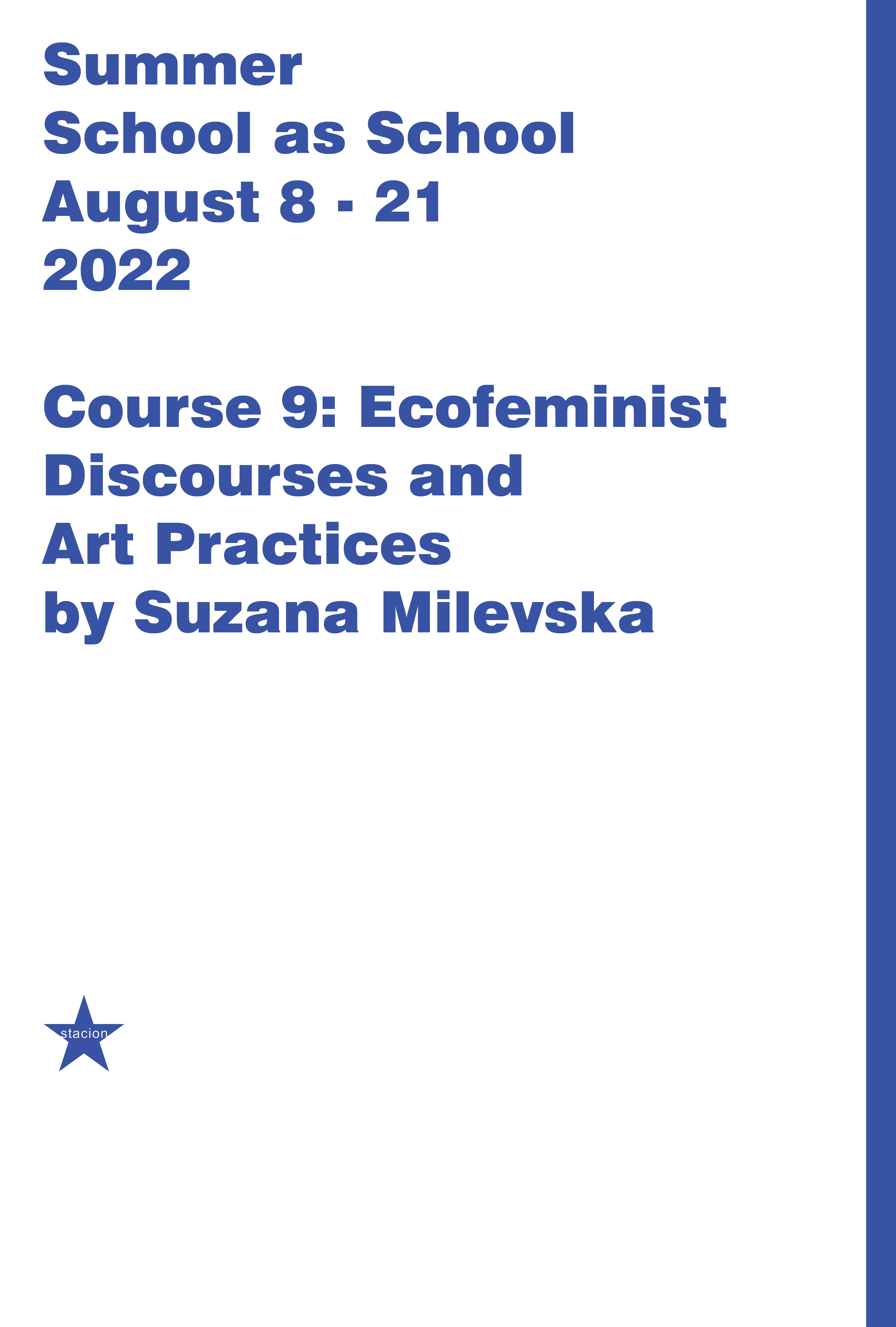
Course 9: Ecofeminist Discourses and Art Practices
by Suzana Milevska
15 – 20 August 2022
2 ECTS
Course Description
Since the early 1970s, many feminists, especially ecological feminists ("ecofeminists"), have defended the assumption that the environment is a feminist issue and problematized the linkage between the dominant understandings of the environment with Anthropocentrism. Ecofeminists saw a correlation between the general status of women in society and the exploitation of the environment. The dominance, which men have assumed over earth is reflected in the dialectical relation between men and women. Both feminism and eco-feminism stand for an egalitarian, non- hierarchical system and for providing an alternative vision for a more egalitarian harmonious future society. This course is therefore imagined as a contextualisation of the existing ecofeminist discourses and debates in the more recent critical discourses of critic of capitalism and imperialism, Anthropocene, Capitalocene, and the calls for decolonisation, with a more narrow focus on ecofeminist critical art practices in “Chthulucene”.
[...] there is something subjective, philosophically naïve, and even something hazardous in a time of ecological crisis, about living in a reference frame where one species takes itself as absolute and values everything else in nature relative to its potential to produce value for itself. (Holmes Rolston III, “Value of Nature and Nature of Value”, in Robin Attfield and Andrew Belsey, eds. Philosophy and the Natural Environment, Cambridge University Press, 1994)
Dr. Milevska will first discuss various historic, socio-ecological and political movements against pollution, extraction, and destruction of the human and natural resources from post-Marxist theoretical perspectives (e.g. D. Harvey’s “dispossession by accumulation”). The theoretical background addressing global climate and the environmental crisis will provide a critique of the historic context in order to understand the urgency of gendered approach not only towards ecological issues, but also critical feminist relationship with capitalism, racism and sexism that calls for constituting a new ecological ethics. The general course’s aims are to look at such critical initiatives in terms of ecofeminism, feminist ecology, and environmental philosophy and to contextualise the visual art practices of women artists who mounted ecofeminism as a critical frame that not only offers environmental awareness, but also aims to deconstruct the assumptions dwelling on stereotypical and patriarchal, hierarchical and trivialising understanding of women's role in the realms of creativity and productivity that for long dominated the art discourses. Patriarchal systems in different world cultures have long interpreted women as obsessed with cleaning and purification, in parallel to the anthropologically driven representation of women as ‘dirty’, and subsequently with cleaning and cleansing. Nevertheless, ever since Mary Douglas published her quintessential book Purity and Danger: An Analysis of Concepts of Pollution and Taboo (1966), the stark contrast of clean and pure versus dirty became blurred and unviable. One of the course’s aims is to stress that today it becomes inevitable to distinguish between the use of problematic stereotypical interchangeable metaphors between women and nature while still celebrating women’s eco-care and concerned approach towards maintenance and preservation of natural resources.
Biography
Suzana Milevska is an awarded curator and theorist of art and visual culture, based in Skopje, North Macedonia. In her theoretical research she employs postcolonial and feminist institutional critique of representational regimes of hegemonic power in arts and visual culture, and the deconstruction and decolonization of contentious cultural heritages in art institutions, collections, and public spaces. Milevska’s curatorial projects focus on collaborative and participatory art practices, feminist projects by women artists looking at visual microhistories in historic and family photographic archives, and community-based projects in solidarity with various marginalised and disenfranchised communities.
In 2019, Milevska curated the exhibition Contentious Objects/Ashamed Subjects at the Polytechnic University Milan as Principal Investigator of TRACES – Transmitting of Contentious Cultural Heritages with the Arts – From Intervention to Co-production (EU Programme Horizon 2020, 2016-2019). From 2013 to 2015, she was Endowed Professor of Central and South Eastern European Art Histories, Academy of Fine Arts Vienna. In 2004 Milevska was a Fulbright Senior Research Scholar (Library of Congress, Washington D.C.). She holds a PhD in Visual Cultures from Goldsmiths College London. In 2012, Milevska won the ALICE Award for Political Curating, and the Igor Zabel Award for Culture and Theory.
Her publications include the book Gender Difference in the Balkans (VDM Verlag, 2010), and the readers The Renaming Machine: The Book (P.A.R.A.SI.T.E. Institute, 2010), On Productive Shame, Reconciliation, and Agency (SternbergPress, 2016), and Inside Out – Critical Discourses Concerning Institutions (co-edited with Alenka Gregorič, 2016).
Currently she is working on her long-term research project The Ethical and Aesthetical Protocols of Apology that she started as Künstlerhaus Büchsenhausen Research Fellow in Innsbruck for 2021/2022.
Participation
10 participants will be selected to participate in this course. Eligible participants must read the Terms information, fill out the application form, upload the required documents and submit the application form. Incomplete applications will not be considered.
The participation fee is 300€.
10 participants will be selected to participate in this course. Eligible participants must read the Terms information, fill out the application form, upload the required documents and submit the application form. Incomplete applications will not be considered.
The participation fee is 300€.
Scholarships are available for participants from Kosovo.